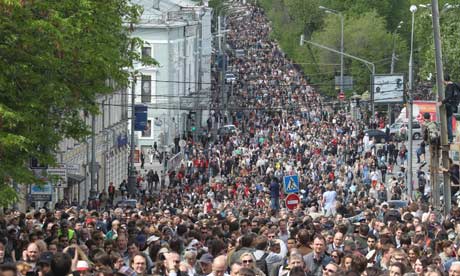
More than 15,000 protesters marched from Pushkin Square to the Chistye Prudy metro station in Moscow on M

More than 15,000 protesters marched from Pushkin Square to the Chistye Prudy metro station in Moscow on M

Massive rally in Moscow in support of honest elections, February 4, 2012.
By Doug Lorimer
Doug Lorimer is a member of the National Executive of the DSP. This article is based on a report adopted by the 14th National Conference of the DSP, held in Sydney, January 2-6, 1992.
©Resistance Books 1997; first published 1992, second (revised) edition 1997
Contents
January 10, 2012 -- Real News Network -- As the Russian protests rocked the plans of President Putin, who, as Boris Kargalitsky wrote, wanted the elections to legitimise decisions that had already been made, these protests, as he said, essentially were led by segments that were more or less neoliberal or nationalist, but not much by what I guess Boris would call the left. And why is that? So now joining us to talk about the state of the left in Russia is Boris Kagarlitsky. He's a sociologist. He was a deputy to the Moscow city soviet between 1990 and '93. And he's currently the director of the Institute of Globalisation and Social Movements in Moscow.
By the Russian Socialist Movement

Tens of thousands protest in Bolotnaya Square, Moscow, December 10, 2011. Photo by Andrey Kolganov.
By Boris Kagarlitsky
December 21, 2011 -– Links International Journal of Socialist Renewal -- The calls by the “moderate left” for passively following behind the liberals are supposedly based on the need to “work among the people”, to go where the masses are. But how, and with whom, are the forces of the left to set out after these ardently pursued masses? With badly printed leaflets full of abstract slogans?

Bolotnaya Square, Moscow, December 10, 2011. Photo by Andrey Kolganov.

By Boris Kagarlitsky, translated from Russian by Renfrey Clarke
Boris Kagarlitsky.
[In English at http://www.links.org.au/node/2593.]Por Boris Kagarlitsky, traducido del inglés para Rebelión por Germán Leyens
El sistema económico internacional que se perfiló después del colapso de la Unión Soviética todavía no está muerto, pero está moribundo. Lo vemos todos los días, no solo en informes sobre la crisis sino también en otras noticias de todo el mundo que cuentan la misma historia: el sistema no funciona.
La verdad es que el sistema nunca ha funcionado para los pobres y las clases trabajadoras. No se diseñó con ese propósito, no importa lo que nos digan todo el tiempo sus propagandistas y diversos intelectuales corruptos. El sistema funcionó para las elites: generó una tremenda redistribución de la riqueza y del poder a favor de los que ya eran ricos y poderosos. Aunque las elites no tienen suficiente coraje para admitirlo, hay que transformar el sistema.
Boris Kagarlitsky.
By Boris Kagarlitsky